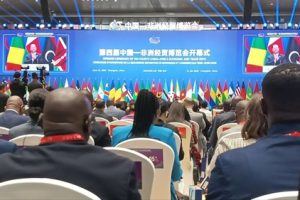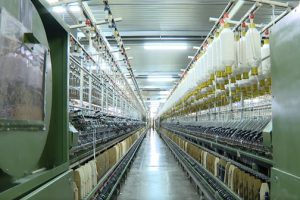
BY MENGESHA AMARE
Many have stated that Foreign Direct Investment (FDI) has a big impact on the economy, employment opportunities, and competitiveness, which in turn can potentially contribute to a given nation’s growth, prosperity and overall development.
The Ethiopian Herald had recently a stay with an economist goes by the name Adamu Gobena, who graduated Dilla University in economics and working for one of the UN Agencies, to have a piece of information about FID pros and cons, if any, so as to weigh what is important citing the case of Ethiopia, for instance.
He said, “Bringing economic stability to a country by increasing its capital is one of the most important roles FDI has been playing. Such a rewarding move has also resulted in financing new businesses, development undertakings as well as other important aspects for economic advancement.” FDI has been quite important in today’s economic situation globally for a number of reasons like enhancing capital, providing the nation, Ethiopia in this case, with the required resources and facilities from other countries to overcome its challenges and improve economic conditions, he said.
Besides, FDI enhances international trade by promoting imports and exports of various business products, and this in turn increases revenue and the relationship between both the host and the source countries, expands new-age technologies thereby improving the quality of local and old business models and increasing productivity and competitiveness.
As to him, since FDI is an integral part of an open and effective international economic system and a major catalyst to development, it has these days been a key element in international economic integration because it creates stable and long-lasting links between nations. Foreign direct investment has become a cornerstone for both governments and corporations. By acquiring a controlling interest in foreign assets, corporations can quickly attain new products and technologies, as well as sell their existing products to new markets. Besides, governments can create jobs and improve economic growth by encouraging foreign direct investment.
“FDI is of significantly useful in fostering Ethiopia’s economic growth as it would receive foreign direct investment often experience higher economic growth by opening it up to new markets, fueling job creation and employment since it is designed to create new businesses in the host country, intensifies technology transfer since it often introduces world-class technologies and technical expertise to developing countries like Ethiopia,” he said. According to Adamu, foreign direct investment also plays an important role on a microeconomic level. Domestic companies that expand into foreign markets can realize significant growth. Moreover, exposure to more than one country also enhances diversification.
Foreign direct investment is significant for developing economies and emerging markets where companies need funding and expertise to expand their international sales. Private investment in infrastructure, energy, and water is a critical driver of the economy as helps in increasing jobs and wages. Yes, he said, FDI is of paramount importance in diversifying investors portfolio, promoting stable long term lending, infusing new technology in developing nations, providing developing countries with financing, bringing in technological knowhow and managerial expertise and creating more jobs and opportunities.
As to him, FDI frequently goes beyond mere capital investment as it may include the provision of management, technology, and equipment as well. A key feature of foreign direct investment is that it establishes effective control of the foreign business or at least substantial influence over its decision making. “Foreign Direct Investment may involve mergers, acquisitions, or partnerships in retail, services, logistics, or manufacturing. It is when an investor living in one country invests in a business based in another country,” he said. Furthermore, he added FDI is an approach that would help developing countries like ours improve infrastructure, raise living standards, create competitive global capital allocation and facilitate economic growth or repair.
Today, Ethiopia has been trying to be one of the most attractive destinations for foreign direct investments thanks to liberalized norms, easy policies and subsidized rates. Foreign investors are also willing to invest in the country due to lower labor costs, market diversification, subsidies, and preferential tariffs. True, for example, a foreign investor can invest in an Ethiopian business through acquiring voting stock in a foreign company, mergers and acquisitions, joint ventures with foreign corporations and starting a subsidiary of a domestic firm in a foreign country.
In due course of entertaining FDI, increased employment translates to higher incomes and equips the population with more buying powers, boosting the overall economy of a country. Companies in developing countries need multinational funding and expertise to expand, give structure, and guide their international sales. These foreign companies need private investments in infrastructure, energy, and water in order to increase jobs and salaries, he added.
“Economic growth is one of the advantages of FDI as the creation of jobs is one of its most obvious advantages, and one of the most important reasons why a nation seeks to attract foreign direct investment. FDI boosts the manufacturing and services sector which results in the creation of jobs and helps to reduce unemployment rates in the country. Increased employment translates to higher incomes and equips the population with more buying powers, boosting the overall economy of a country,” he said. It is also of significantly useful in boosting human capital development. Human capital involved the knowledge and competence of a workforce. Skills that employees gain through training and experience can boost the education and human capital of a specific country.
Besides, businesses in the county receive access to the latest financing tools, technologies, and operational practices from all across the world. The introduction of newer and enhanced technologies results in company’s distribution into the local economy, resulting in enhanced efficiency and effectiveness of the industry. It helps the nation have improved capital flow. Inflow of capital is particularly beneficial for countries with limited domestic resources, as well as for nations with restricted opportunities to raise funds in global capital markets.
By facilitating the entry of foreign organizations into the domestic marketplace, FDI helps create a competitive environment, as well as break domestic monopolies. A healthy competitive environment pushes firms to continuously enhance their processes and product offerings, thereby fostering innovation. Consumers also gain access to a wider range of competitively priced products. However, said Adamu, Foreign Direct Investment is also has its own disadvantages in counties like hindrance of domestic investment. Sometimes it can hinder domestic investment since countries’ local companies start losing interest to invest in their domestic products because of FDI.
Taking all the merits of FDI into account he said it is also important to notice its potential cons, too. As many countries protect certain strategic industries, like defense, from foreign direct investment to maintain control from foreign entities, and long-term capital movement as well as disruption of local industry-there is some concern that foreign direct investment may disrupt local industry and economies by attracting the best workers and creating income disparity.On a macro level, foreign direct investment can cause problems for a country’s domestic labor markets and drain capital in the long run. On a micro level, the investments have several risks that should be carefully considered.
It can sometimes affect exchange rates to the advantage of one country and the detriment of another and economic non-viability, considering that foreign direct investments may be capital-intensive from the point of view of the investor, it can sometimes be very risky or economically non-viable. It would also pull a modern-day economic colonialism; many developing countries, peculiarly those with a history of colonialism, worry that foreign direct investment would result in some kind of modern-day economic colonialism, which in turn exposes them and leave them vulnerable to foreign companies’ exploitation.
THE ETHIOPIAN HERALD WEDNESDAY 14 JUNE 2023




